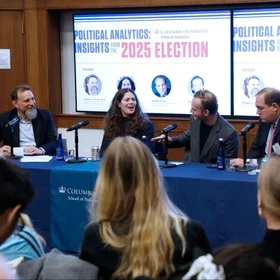Americans for Prosperity Foundation v. Rodriquez to be argued April 26
When the United States Supreme Court hears oral argument on the morning of April 26, Columbia University Professor Cindy Lott will be avidly listening; she and other nonprofit legal scholars wrote and submitted a “scholars’ amicus” brief to the Court in the case, Americans for Prosperity Foundation v. Rodriquez. Lott’s empirical and scholarly research is cited in a number of the briefs submitted in the case, including that of the respondent state of California. “AFPF v. Rodriquez squarely addresses the question whether nonprofit donor reporting to a state regulatory body is constitutional under the freedoms of speech and association afforded by the First Amendment. For the first time in decades, the Supreme Court will be focused on state charities regulation, the subject of my research at both Columbia and the Urban Institute.”
The case follows the well known case of NAACP v. Alabama, decided at a critical juncture in civil rights history in 1958. Garnering dozens of amicus briefs, AFPF v. Rodriquez also raises the opportunity for the Supreme Court to refine or elaborate on its previous holding in Citizens United v. Federal Election Committee (2010), which held that corporate speech for electioneering could not be limited under the First Amendment and involved a 501(c)(4), a specific type of nonprofit organization. “This case illustrates the collision course that nonprofit law and election law have been on for many years, made even murkier by Citizens United,” Lott explains. Even if the Court decides the APFP case on narrow grounds, the ruling likely will harbor far-reaching implications for charities, state regulators, and their donor disclosure requirements.
“You’re seeing very different types of narratives in this case,” Lott told The ABA Journal. “You have amicus groups concerned about transparency versus those who want to make sure First Amendment associational rights are protected.”
The Chronicle of Philanthropy spoke to Lott about the range of possible outcomes in the case. “The court could narrowly rule on the California case in a way that sheds little light on the court’s view of whether charity donors have a constitutional right to privacy, or it could reach a sweeping conclusion on that point.” Lott also was an invited expert on the National Constitution Center’s “We the People” podcast with the NCC’s President and CEO Jeffrey Rosen, where she and an ACLU attorney elaborated on what is at stake in the case, including the potential intersection with Citizens United. Tune in here.
Professor Lott first delved into state charities regulation while teaching an advanced research seminar on State Attorneys General at Columbia Law School. Since then, as Associate Professor of Practice at Columbia’s School of Professional Studies, she has partnered with other research colleagues across the country to produce further research on charitable regulatory policy. “Billions of dollars flow through the charitable sector every year, and the majority of the oversight of that sector is done at the state level. My work always has been at the intersection of practitioners, policymakers, and researchers in order to strengthen the nonprofit sector and enhance thoughtful and consistent regulation, even as we respect our federalist system.”
The Supreme Court is expected to issue its opinion in AFPF v. Rodriquez by the end of June, the end of its term this year.
Learn more about Columbia’s M.S. in Nonprofit Management, which prepares graduates for leadership roles within mission-driven organizations.


